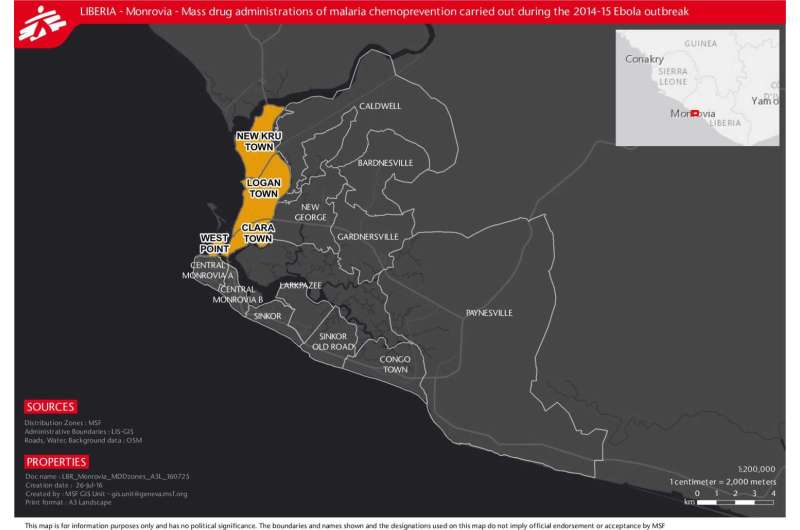Liberian malaria cases declined following mass drug administration during Ebola outbreak

Mass drug administration may have reduced malarial incidence during the 2014 Ebola outbreak in Liberia, according to a study published August 31, 2016 in the open-access journal PLOS ONE by Anna Kuehne from Epicentre, France, and colleagues.
Malaria is endemic in Liberia and transmission continued throughout the Ebola outbreak in the fall of 2014, which caused severe disruption of healthcare services. Unfortunately, the similar clinical presentation of Ebola and malaria cases meant that an unknown number of malaria patients were admitted as suspect Ebola cases, putting them at risk of exposure to Ebola and adding further strain to treatment units. During the outbreak, Médecins Sans Frontières implemented an antimalarial mass drug administration (MDA) program in Liberia's capital city, Monrovia, administering two rounds of preventative combination therapy. To evaluate the intervention's success, the authors of the present study interviewed 222 participating households.
The authors found that the monthly incidence of malaria fever cases declined from 4.3% prior to the intervention to 1.5% just after. While 96% of households attended both rounds of drug administration, actual treatment compliance was low: 52% of households used the drugs in round one, and just 22% used them in round two. Many respondents said they had instead saved the drugs for use in future malaria episodes, and the authors speculate that misconceptions about health interventions may also have affected uptake.
Mass drug administrations have rarely been carried out on such a large scale, and this study reports the first to occur during an Ebola outbreak. The authors suggest that MDA may be effective in reducing malaria, but note that longer term improvements in healthcare access could reduce malarial incidence further and reduce the need for respondents to save drugs to treat future malaria episodes.
More information: Kuehne A, Tiffany A, Lasry E, Janssens M, Besse C, Okonta C, et al. (2016) Impact and Lessons Learned from Mass Drug Administrations of Malaria Chemoprevention during the Ebola Outbreak in Monrovia, Liberia, 2014. PLoS ONE 11(8): e0161311. DOI: 10.1371/journal.pone.0161311
















